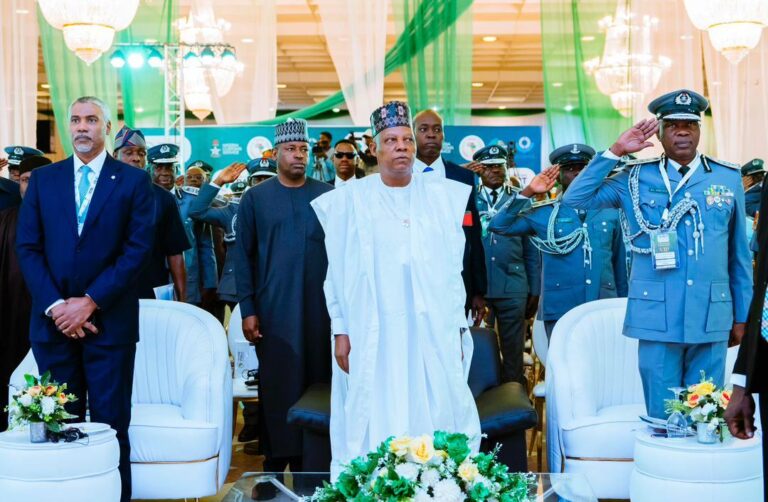President Bola Tinubu has utilized the inaugural Customs Partnership for African Cooperation in Trade (C-PACT) conference in Abuja to affirm the Nigerian government’s resolute commitment to dismantling structural business challenges and supercharging the economy under his Renewed Hope Agenda. The President emphasized that achieving national prosperity and fulfilling AfCFTA’s promise requires decisive execution, not merely theoretical agreement.
Foundational Reforms for Economic Rebound
President Tinubu detailed the immediate, high-impact reforms undertaken to create a stable, predictable, and trade-friendly environment:
-
Monetary Policy: Unification of the foreign exchange market window.
-
Fiscal Policy: Elimination of fuel subsidies to redirect critical resources toward infrastructure development.
-
Logistics Efficiency: Modernization of port operations to achieve 24-hour cargo clearance.
Central to Nigeria’s continental trade ambition is the National Single Window, a transformative digital platform. The President guaranteed that Phase One of this platform will be operational by March 2026, with the full rollout scheduled for December 2026.
These coordinated institutional changes, he argued, are already yielding results, confirming that the Nigerian economy is regaining momentum and asserting its influence across Africa and globally.
Integrated Trade Enablement Architecture
The administration stressed the shift from agency-specific “silos” to a unified, integrated trade architecture. This systemic approach involves strategic alignment across key agencies:
-
Nigeria Customs Service (NCS): Driving the adoption of digital clearance and risk-based inspections.
-
Nigerian Ports Authority (NPA): Focusing on port efficiency and throughput.
-
Central Bank of Nigeria (CBN): Facilitating local-currency settlements via the Pan-African Payment and Settlement System (PAPSS).
-
Standards Organization (SON): Harmonizing product standards with continental requirements.
-
NEPC and NEXIM Bank: Providing targeted export readiness support and financing.
Tinubu emphasized that this comprehensive, integrated approach is indispensable for continental success, as no single entity can deliver the scale of reform necessary for Africa’s prosperity.
Actionable Metrics Validate Progress
The President highlighted that Nigeria is approaching its continental responsibilities with practical systems and tangible infrastructure, rather than rhetoric. He affirmed that a robust continental market is engineered through action, not simply declared.
-
Trade Growth: Nigeria’s non-oil exports to African markets experienced a $38\%$ year-on-year increase in 2024.
-
Logistics Improvement: Cargo clearance time at major seaports has seen an approximate $30\%$ reduction since 2023.
-
AfCFTA Projection: Intra-African trade is projected to expand from $15\%$ (2023) to $25\%$ by 2030 under the AfCFTA framework.
These validating metrics underscore the principle that disciplined processes and the removal of structural barriers lead to rapid and dynamic expansion in African trade.
Ministerial Support and Global Affirmation
Mr. Wale Edun, Minister of Finance (represented by Minister of State for Finance, Dr. Doris Anite), called for the continuous dismantling of trade barriers and reaffirmed the government’s commitment to modernization initiatives within customs administrations. Minister of Industry, Trade, and Investment, Dr. Jumoke Oduwole, echoed this sentiment, confirming Nigeria’s unwavering commitment to AfCFTA implementation and accelerated regional integration under Tinubu’s leadership.
Ian Saunders, Secretary-General of the World Customs Organization (WCO), commended Nigeria’s reforms and pledged WCO’s support in facilitating legitimate trade. Similarly, Kanayo Awani, Vice President of Afreximbank, backed the modernization efforts.
Comptroller-General Adewale Adeniyi urged stakeholders to adopt cross-country integration, emphasizing the need to move beyond “working in silos.” He stated that the primary objective of C-PACT is to ensure customs administrations are more actively involved in AfCFTA implementation while strengthening private sector dialogue. AfCFTA Secretary-General, Wamkele Mene, pledged close cooperation with the NCS to realize the C-PACT objectives.
President Tinubu concluded by calling on African nations to demonstrate the discipline needed to build borders capable of meeting contemporary technological demands, stressing that success will be judged by real outcomes—such as shorter border-crossing times and efficient movement of goods—rather than conference communiqués.

